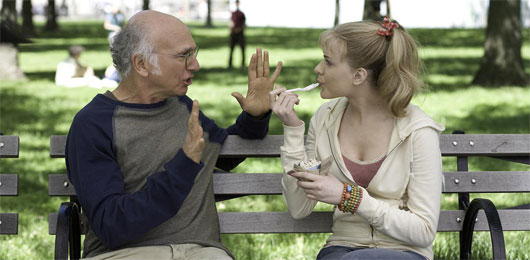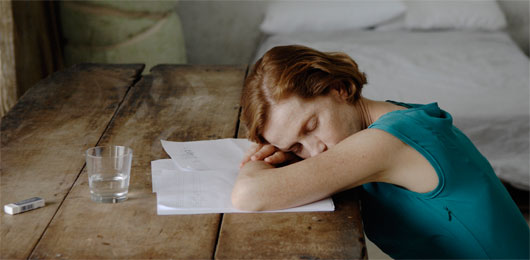 What is there really to say about Shrek Forever After? Its a movie that merely follows on from whats gone before, continuing the slide into ever safer and more merchandising friendly territory. It never rises particularly high, but thankfully never descends into the tedium of Shrek 3 either.
What is there really to say about Shrek Forever After? Its a movie that merely follows on from whats gone before, continuing the slide into ever safer and more merchandising friendly territory. It never rises particularly high, but thankfully never descends into the tedium of Shrek 3 either.
The film tries to give a conclusory note to the franchise, while still keeping the door cracked open for the possibility of a return (not that theyre really ending things anyway, as a Puss In Boot movie is coming next year). The magical Rumpelstiltskin, who feels he was robbed of the throne of Far Far Away when Shrek rescued Princess Fiona in the first film, vows revenge and sets out to find a way to get rid of the big green one. He overhears Shrek bemoaning the fact that he doesnt feel like a real ogre anymore and that he hates his newfound celebrity. Realising this may be a way to make his dream come true, Rumpelstiltskin offers Shrek a day to feel like a true ogre again, in exchange for a day from Shreks childhood.
Although uncertain, Shrek agrees and signs the contract, suddenly finding himself thrust into a world where hes feared and loathed, there are wanted signs up for him and none of his friends recognise him. Searching out Rumpelstiltskin, Shrek discovers that the day he traded away was the day he was born, and because of he never existed, Fiona was never rescued and Rumpelstiltskin became king of Far Far Away. Not only that, but the contract only gives Shrek one day to be a real ogre, and after that hell be erased from existence. With the clock ticking, Shrek must find a way to stop this from happening and put things right again.
Although the Its A Wonderful Life inspired, what if none of what weve seen ever happened, conceit is a bit of a cheesy one, it works decently well. Theres are quite a few funny moments (including a couple of corkers), it looks great and as with Hot To Train Your Dragon, the 3D works surprisingly well not too in your face but it doesnt feel tacked on either. It also runs at quite a pace, so theres no chance of you getting bored, even while its difficult not to feel like despite everyones best effort, theyre trying to squeeze the last few ounces of entertainment out of a concept that was driven up a cul de sac by the first two sequels. The alternate world idea does add a few extra dimensions that stop it feeling as creatively barren as Shrek 3, with the script subtly altering all the characters and events to take into account the lack of Shrek.
Ultimately though, theyve very carefully stuck to the Shrek sequels script, making a safe film that should keep fans passably happy, while those who gave up on the franchise by part 3 will likely still be pining for the freshness, energy and slightly devil-may-care subversiveness of the first film.
However the film is really designed for families, and they should lap it up, enjoying the jokes and the whizz-bang 3D effects. Theres nothing parents will find offensive for their and everything comes with a nice (if rather obvious) moral.
Overall Verdict: It may not be Shrek going out in triumphant fashion, but itll do, and to be honest, with the way the franchise has gone, this is a nice way and often funny way to end.
Reviewer: Phil Caine
 Gay Sex In The 70s is currently playing at selected cinemas and will arrive on DVD on July 26th.
Gay Sex In The 70s is currently playing at selected cinemas and will arrive on DVD on July 26th. The tagline on the poster reads the American dream sucks , which pretty much tells you where you are were in classic Revolution Road/American Beauty/Ice Storm/Little Children/Hal Hartley country, or the world of Cheever/Updike/Yates if youre a reader.
The tagline on the poster reads the American dream sucks , which pretty much tells you where you are were in classic Revolution Road/American Beauty/Ice Storm/Little Children/Hal Hartley country, or the world of Cheever/Updike/Yates if youre a reader. Trust the French to breathe back some life into the dying art form that is the romantic comedy. As Priceless cheered us up all up a couple of years ago, this one does the same, except its warmer and much funnier, and beautifully played. I would say that Hollywood should take note, except they might misinterpret that and just do a remake, which, like most remakes of French films, would probably be a disaster.
Trust the French to breathe back some life into the dying art form that is the romantic comedy. As Priceless cheered us up all up a couple of years ago, this one does the same, except its warmer and much funnier, and beautifully played. I would say that Hollywood should take note, except they might misinterpret that and just do a remake, which, like most remakes of French films, would probably be a disaster. First, the good news. After the disaster of Woody Allens London trilogy, and the partial return to form of Vicky Christina Barcelona, this is back in Allens comfort zone. Set in New York and featuring a cast of Jewish neurotics and misfits, its funny, sweet, warm and sharp, looks lovely and is well acted.
First, the good news. After the disaster of Woody Allens London trilogy, and the partial return to form of Vicky Christina Barcelona, this is back in Allens comfort zone. Set in New York and featuring a cast of Jewish neurotics and misfits, its funny, sweet, warm and sharp, looks lovely and is well acted.  Isabelle Huppert has developed quite a close working relationship with director Benoit Jacquot, with Villa Amalia marking their fifth collaboration. In their latest movie together, Huppert plays musician Ann, whose world is turned upside-down when she sees her husband kissing another woman. With barely any hesitation she decides to leave him, and her whole life, behind, determined to find herself by becoming someone new.
Isabelle Huppert has developed quite a close working relationship with director Benoit Jacquot, with Villa Amalia marking their fifth collaboration. In their latest movie together, Huppert plays musician Ann, whose world is turned upside-down when she sees her husband kissing another woman. With barely any hesitation she decides to leave him, and her whole life, behind, determined to find herself by becoming someone new.
You must be logged in to post a comment.